 Request a FREE Sample of our FcRn Binding Kit!
Request a FREE Sample of our FcRn Binding Kit! Request a FREE Sample of our FcRn Binding Kit!
Request a FREE Sample of our FcRn Binding Kit!
 Limited Edition Golden Llama is here! Check out how you can get one.
Limited Edition Golden Llama is here! Check out how you can get one.  Limited Edition Golden Llama is here! Check out how you can get one.
Limited Edition Golden Llama is here! Check out how you can get one.
 Request a FREE sample of our GMP products!
Request a FREE sample of our GMP products!  Request a FREE sample of our GMP products!
Request a FREE sample of our GMP products!
> CD3 Protein - A hot target for bispecific antibody 
T cell bispecific antibodies (TCBs) are molecules that are engineered to include binding sites to the T cell receptor (TCR) and to tumor-associated or tumor-specific antigens within a single entity. One of the most widely studied TCBs in cancer immunotherapy is CD3, a molecule that has the function of stabilizing TCR structure and transmitting activation signals.
Antibodies against CD3 molecules can stimulate or block T cell activation signal transduction. In addition, these antibodies can eliminate effector T cells or induce a regulatory phenotype in T cells thus, providing a new method for the treatment of organ transplant rejection and autoimmune diseases. These CD3 molecules bind to TCR non-covalently to form a TCR/CD3 receptor complex on the surface of the T cell.
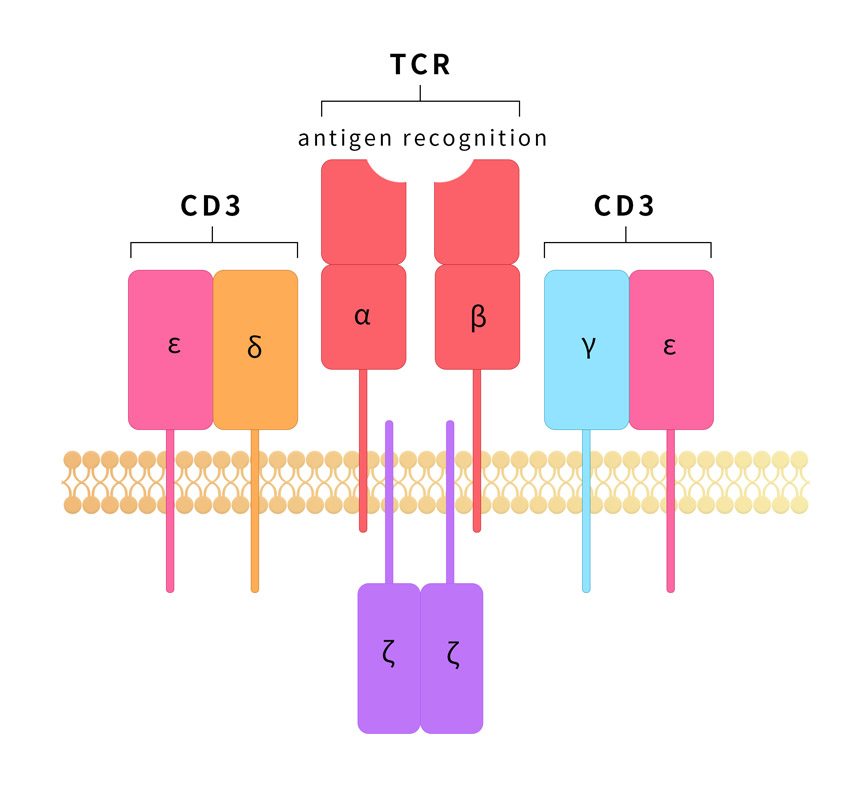
There are 4 subtypes of CD3, including CD3δ, CD3ε, CD3γ, and CD3ζ. CD3δ/CD3ε and CD3γ/CD3ε can form the TCR-CD3 complexes through the α/β chain of TCR as heterodimers. CD3-targeted therapeutic antibody usually recognizes the CD3ε in the heterodimer complex to activate the anti-tumor activity of T cells. However, in the process of recombinant expression, CD3ε and CD3δ can randomly form incorrect heterogeneous complexes, which may lead to the loss of bioactivity and high batch-to-batch inconsistency.
To accelerate the research and development of bispecific antibodies, ACROBiosystems has developed a series of homogeneous CD3δ/CD3ε and CD3γ/CD3ε proteins with high bioactivity. These proteins are verified as a 1:1 heterodimer by nonreductive electrophoresis and MALS respectively. In addition, customer data suggests that bispecific antibody products from ACROBiosystems can be used in applications including, but not limited to clinical pharmacokinetics, therapeutic antibody screening, identification, and characterization.
Successively, our superior CD3 product quality helped accelerate the clinical development of a bispecific antibody into a therapeutic. Click here to download CD3 poster.
![]() Larger product catalog
Larger product catalog
5 molecules: CD3ε& CD3δ, CD3ε& CD3γ, CD3ε, CD3δ, CD3γ |
Various tags: His, His&Avi, Fc, Llama Fc, Flag |
Various species: Human, Mouse, Cynomolgus, Rat, Rabbit |
![]() Homogeneous structure: CD3ε& CD3δ and CD3ε& CD3γ are verified as 1:1 heterodimers by non-reductive electrophoresis and MALS
Homogeneous structure: CD3ε& CD3δ and CD3ε& CD3γ are verified as 1:1 heterodimers by non-reductive electrophoresis and MALS
![]() High bioactivity verified by binding with common antibodies such as OKT3, SP34-2, UCHT1 and BCMA×CD3
High bioactivity verified by binding with common antibodies such as OKT3, SP34-2, UCHT1 and BCMA×CD3
![]() High batch-to-batch consistency guaranteed by strict quality control
High batch-to-batch consistency guaranteed by strict quality control
![]() Suitable for different applications including antibody immunotiter detection, biopanning, antibody screening, affinity characterization and clinical pharmacokinetic assay
Suitable for different applications including antibody immunotiter detection, biopanning, antibody screening, affinity characterization and clinical pharmacokinetic assay
CD3E & CD3D
CD3E & CD3G
CD3 epsilon
CD3 delta
CD3 gamma
| Molecule | Cat. No. | Host | Product Description | Structure |
|---|
| Molecule | Cat. No. | Host | Product Description | Structure |
|---|
| Molecule | Cat. No. | Host | Product Description | Structure |
|---|
| Molecule | Cat. No. | Host | Product Description | Structure |
|---|
| Molecule | Cat. No. | Host | Product Description | Structure |
|---|
Click the molecule to find out your interesting products.
CD3-targeted bispecific and trispecific antibodies represent a fast-growing field in therapeutic antibody development. However, selecting the appropriate detection reagents for custom bioanalytical assays such as ELISAs is challenging. With an abundant selection of CD3 proteins including labels and tags, companies may struggle in developing a highly sensitive and specific assay for their drug therapy.
Here at ACROBiosystems, we can provide a large product catalog of highly bioactive CD3δ/CD3ε, CD3γ/CD3ε products as well as our expertise and our ISO17025-accedited analytical service platform. Using our analytical service platform, we offer customized services from paired protein screening to ELISA-based assay release method development, validation, and kit development to help accelerate your R&D process!
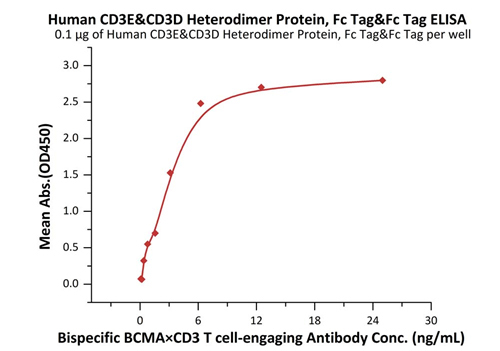
Immobilized Human CD3E&CD3D Heterodimer Protein, Fc Tag&Fc Tag (Cat. No. CDD-H5255) at 1 μg/mL (100 μL/well) was spiked with different concentrations of bispecific BCMA×CD3 T cell-engaging Antibody. The identified linear range was found to be 0.8-6 ng/mL.
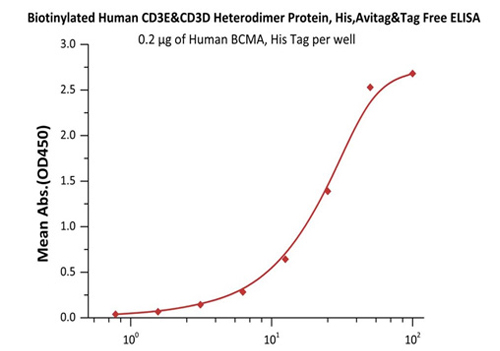
Immobilized Human BCMA, His Tag (Cat. No. BCA-H522y) was bound to a 96-well plate. Increasing concentrations of bispecific T cell Engager (CD3 X BCMA) spiked in 10% human serum and Biotinylated Human CD3E&3D Heterodimer Protein, His,Avitag&Tag Free (Cat. No. CDD-H82W6) at 0.2 μg/mL was added to each well. Detection was performed using HRP-conjugated streptavidin with sensitivity of 15 ng/mL.
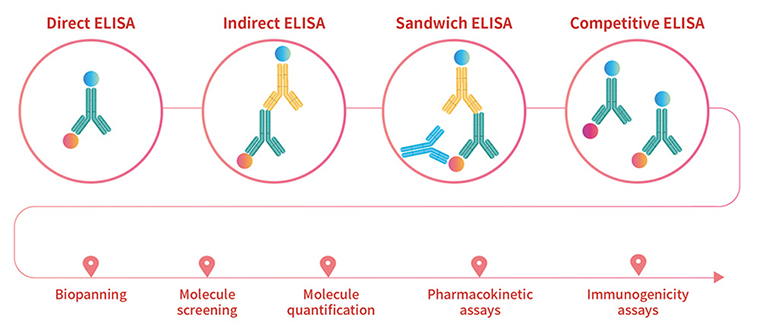
Flexible assay designs and report formats for your personalized needs
ACRO proteins are supplied for free
Only samples are required for service completion
ACROBiosystems scientist will respond within 24 hours of submission.
Call us at: +1 800-810-0816 or email at services@acrobiosystems.com for consultation.
ACROBiosystems has developed a series of homogeneous CD3 proteins with good bioactivity, which are verified as 1:1 heterodimer by nonreductive electrophoresis and MALS.
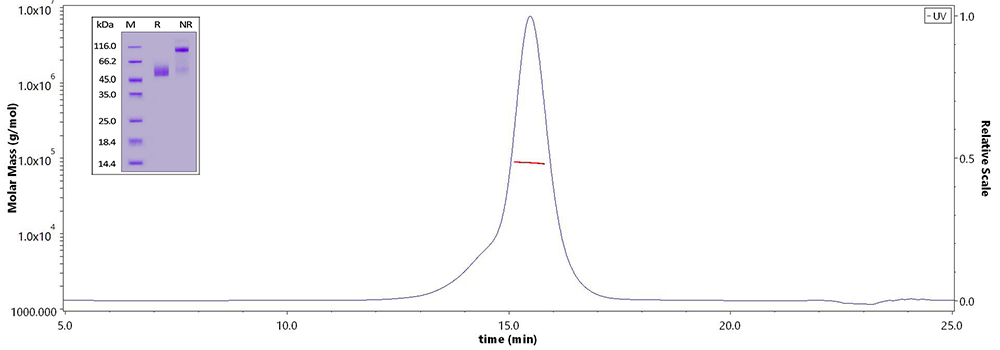
Fig.1 Human CD3E&CD3D Heterodimer Protein (Cat. No. CDD-H52Wa) on SDS-PAGE under reducing (R) and non-reducing(NR)condition and the purity of the protein is greater than 95%. The purity of the protein is more than 85% and around 80-90 kDa verified by SEC-MALS.
These verified authentic 1:1 heterodimer proteins show high bioactivity in different applications. The products are homogenous with strict quality control to guarantee the minimal batch-to-batch differences.
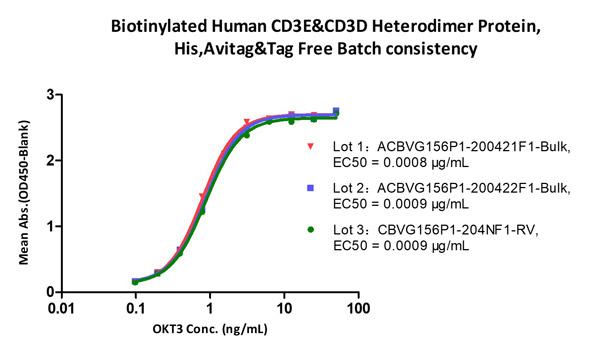
Fig.2 Immobilized Biotinylated Human CD3E&CD3D Heterodimer Protein, His,Avitag&Tag Free (Cat. No. CDD-H82W6) at 1 μg/mL (100 μL/well) on Streptavidin (Cat. No. STN-N5116) precoated (0.5 μg/well) plate, can bind Monoclonal Anti-Human CD3 Antibody, Mouse IgG2a (Cat. No. CDE-M120a) with a linear range of 0.2-6 ng/mL (QC tested), and batch differences EC50<0.0001 μg/mL.
These products are suitable for various applications at different stages of drug development, such as antibody immunotiter detection, biopanning, antibody screening, affinity characterization and clinical pharmacokinetic assays.
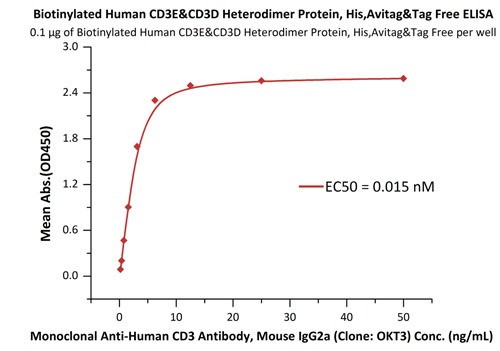
Fig.3 Immobilized Biotinylated Human CD3E&CD3D Heterodimer Protein, His,Avitag&Tag Free (Cat. No. CDD-H82W6) at 1 μg/mL (100 μL/well) on streptavidin precoated (0.5 μg/well) plate, can bind Monoclonal Anti-Human CD3 Antibody, Mouse IgG2a (Cat. No. CDE-M120a) with a linear range of 0.2-6 ng/mL.
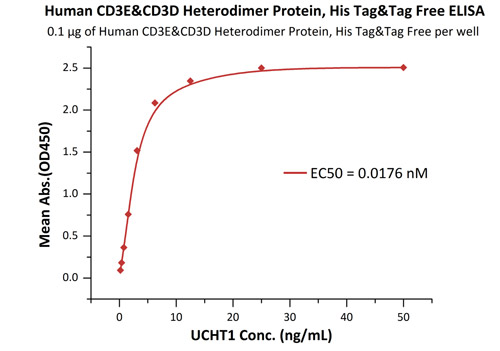
Fig.4 Immobilized Human CD3E&CD3D Heterodimer Protein, His Tag&Tag Free (Cat. No. CDD-H52W1) at 1 μg/mL (100 μL/well) can bind Anti-CD3 antibody with a linear range of 0.2-6 ng/mL.
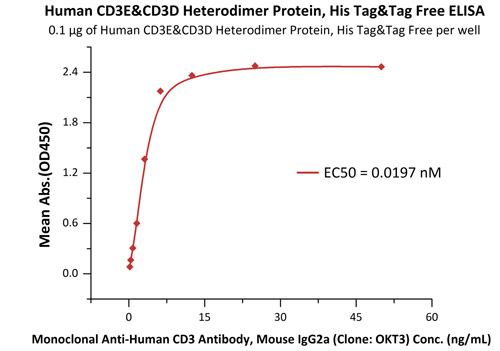
Fig.5 Immobilized Human CD3E&CD3D Heterodimer Protein, His Tag&Tag Free (Cat. No. CDD-H52W1) at 1 μg/mL (100 μL/well) can bind Monoclonal Anti-Human CD3 Antibody, Mouse IgG2a (Cat. No. CDE-M120a) with a linear range of 0.2-6 ng/mL.
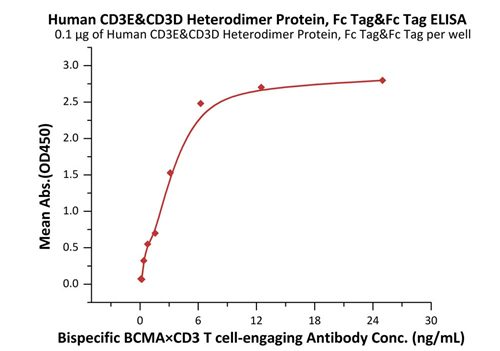
Fig.6 Immobilized Human CD3E&CD3D Heterodimer Protein, Fc Tag&Fc Tag (Cat. No. CDD-H5255) at 1 μg/mL (100 μL/well) can bind Bispecific BCMA×CD3 T cell-engaging Antibody with a linear range of 0.8-6 ng/mL.
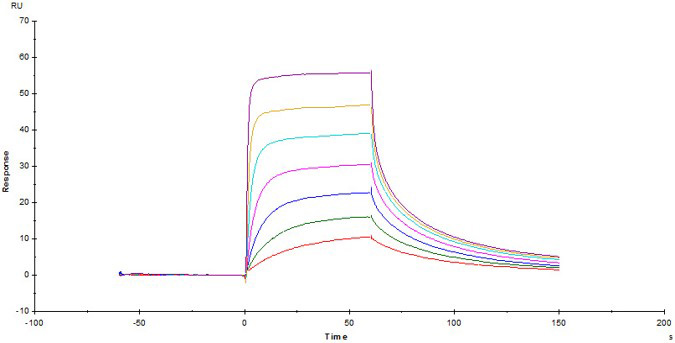
Fig.7 Biotinylated Human CD3E&CD3D Heterodimer Protein, His,Avitag&Tag Free (Cat. No. CDD-H82W6) captured on Biotin CAP - Series S sensor Chip can bind Anti-Human CD3 Antibody, Mouse IgG2a with an affinity constant of 22.5 nM as determined in a SPR assay (Biacore T200) .
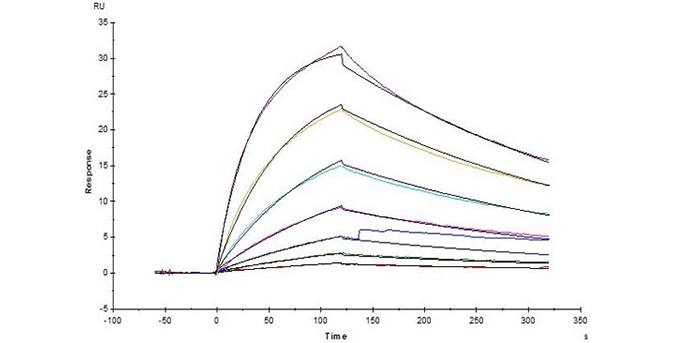
Fig.8 Bispecific T-cell Engager (CD3 X BCMA) immobilized on CM5 Chip can bind Human CD3E&CD3D Heterodimer Protein, His Tag&Tag Free (Cat. No. CDD-H52W1) with an affinity constant of 31.8 nM as determined in a SPR assay (Biacore T200).
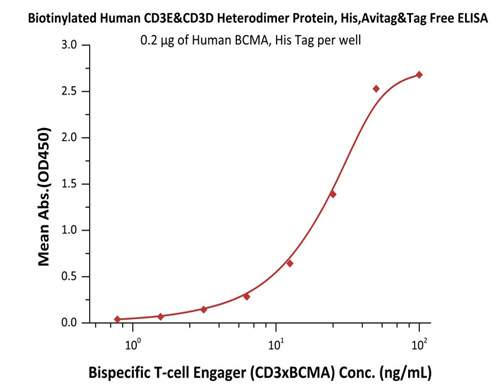
Fig.9 Immobilized Human BCMA, His Tag (Cat. No. BCA-H522y) at 2 μg/mL, add increasing concentrations of Bispecific T cell Engager (CD3 X BCMA) in 10% human serum and then add Biotinylated Human CD3E&CD3D Heterodimer Protein, His,Avitag&Tag Free (Cat. No. CDD-H82W6) at 0.2 μg/mL. Detection was performed using HRP-conjugated streptavidin with sensitivity of 15 ng/mL.
This web search service is supported by Google Inc.
